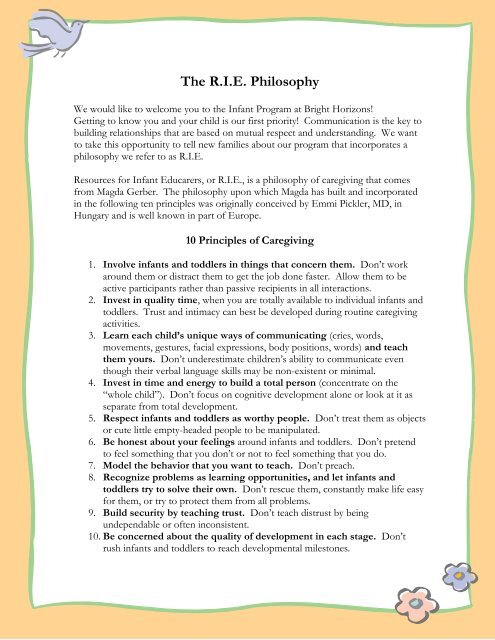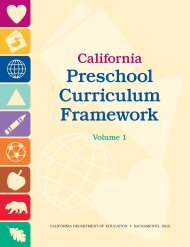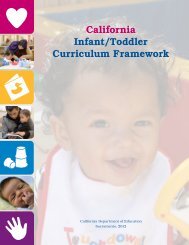The R.I.E. Philosophy - ECEZero2Three: Dana's Child Health and ...
The R.I.E. Philosophy - ECEZero2Three: Dana's Child Health and ...
The R.I.E. Philosophy - ECEZero2Three: Dana's Child Health and ...
Create successful ePaper yourself
Turn your PDF publications into a flip-book with our unique Google optimized e-Paper software.
<strong>The</strong> R.I.E. <strong>Philosophy</strong><br />
We would like to welcome you to the Infant Program at Bright Horizons!<br />
Getting to know you <strong>and</strong> your child is our first priority! Communication is the key to<br />
building relationships that are based on mutual respect <strong>and</strong> underst<strong>and</strong>ing. We want<br />
to take this opportunity to tell new families about our program that incorporates a<br />
philosophy we refer to as R.I.E.<br />
Resources for Infant Educarers, or R.I.E., is a philosophy of caregiving that comes<br />
from Magda Gerber. <strong>The</strong> philosophy upon which Magda has built <strong>and</strong> incorporated<br />
in the following ten principles was originally conceived by Emmi Pickler, MD, in<br />
Hungary <strong>and</strong> is well known in part of Europe.<br />
10 Principles of Caregiving<br />
1. Involve infants <strong>and</strong> toddlers in things that concern them. <br />
around them or distract them to get the job done faster. Allow them to be<br />
active participants rather than passive recipients in all interactions.<br />
2. Invest in quality time, when you are totally available to individual infants <strong>and</strong><br />
toddlers. Trust <strong>and</strong> intimacy can best be developed during routine caregiving<br />
activities.<br />
3. <br />
(cries, words,<br />
movements, gestures, facial expressions, body positions, words) <strong>and</strong> teach<br />
them yours. <br />
<br />
though their verbal language skills may be non-existent or minimal.<br />
4. Invest in time <strong>and</strong> energy to build a total person (concentrate on the<br />
<br />
separate from total development.<br />
5. Respect infants <strong>and</strong> toddlers as worthy people. <br />
or cute little empty-headed people to be manipulated.<br />
6. Be honest about your feelings <br />
to feel something that yo<br />
7. Model the behavior that you want to teach. <br />
8. Recognize problems as learning opportunities, <strong>and</strong> let infants <strong>and</strong><br />
toddlers try to solve their own. <br />
for them, or try to protect them from all problems.<br />
9. Build security by teaching trust. <br />
undependable or often inconsistent.<br />
10. Be concerned about the quality of development in each stage. <br />
rush infants <strong>and</strong> toddlers to reach developmental milestones.
<strong>The</strong> foundation of the R.I.E. <strong>Philosophy</strong> <strong>and</strong> its principals is RESPECT! <strong>The</strong><br />
meaning of the word respect is somewhat abstract <strong>and</strong> not usually associated<br />
with infants <strong>and</strong> toddlers. Respecting young children, unlike other childrearing<br />
fads that promoted the use of flashcards or teaching a baby to read, is<br />
unlikely to go out of style or found to be damaging to the child. Caregivers<br />
that respect infants <strong>and</strong> toddlers have learned to see them as competent human<br />
beings who, like all humans, deserve to be treated respectfully.<br />
<br />
they are not yet ready to do. Babies do not need to be pushed or taught the<br />
next milestones. <strong>The</strong>y will do it all by themselves when they are ready. Infants<br />
are perfectly designed to do exactly what they should be doing to achieve the<br />
next milestone. When adults put infants into positions they can not get in <strong>and</strong><br />
out of themselves, they deny the child the opportunity to practice the skill on<br />
his or her own.<br />
Our program allows babies to move freely, permitting them to learn about<br />
their world at their own pace. When infants are free to make their own<br />
choices, they do not depend on adults to constantly entertain them. This is<br />
important so caregivers can give each child one-on-one attention during<br />
routines like feeding <strong>and</strong> diapering. Routines are actually part of our<br />
curriculum <strong>and</strong> considered to be quality learning experiences. We always tell<br />
the baby what we are going to do before we do it. This practice eventually<br />
allows the child to anticipate what is going to happen which leads to their trust<br />
in us <strong>and</strong> in their environment.<br />
We know how crucial the first three years of life are in developing basic<br />
lifelong patterns of coping, living, <strong>and</strong> learning. Research tells us that the most<br />
<br />
caring adult. <strong>The</strong> first attachment, of course, is to the parents, but caregivers<br />
<br />
rimary caregiver will<br />
know your child best. <strong>The</strong> relationship they build together during routines will<br />
serve as an emotional refueling that will empower your child with a sense of<br />
trust <strong>and</strong> security. A prerequisite to all learning is trusting that your needs will<br />
be met by a consistent caregiver who knows <strong>and</strong> underst<strong>and</strong>s you.<br />
If you would like more information about R.I.E., we recommend Your<br />
Self-Confident Baby by Magda Gerber <strong>and</strong> Allison Johnson. Other<br />
information is available upon request. We are always open to any questions<br />
you have regarding our family care services.
















